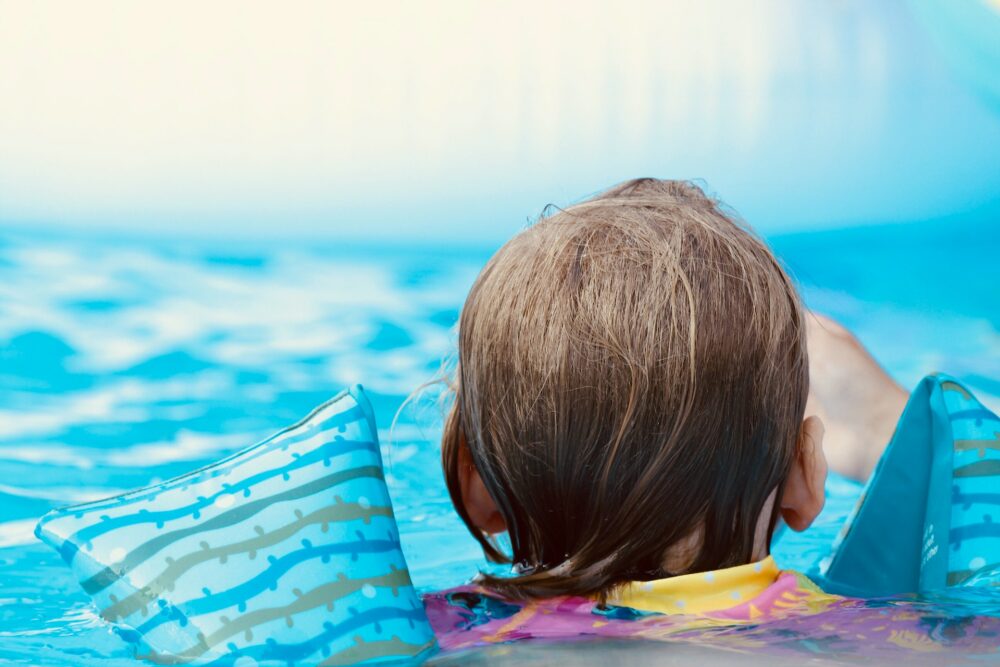Diving into the world of swim education for your kids isn’t just about water safety – it’s a transformative investment with far-reaching benefits. Here are some tangible and lasting outcomes stem from providing your children with quality swim education. From physical health to enhanced cognitive abilities, the advantages are as diverse as they are profound.
1. Water Safety Mastery
The most immediate and crucial benefit of investing in your child’s swim education is the mastery of water safety skills. By equipping them with essential swimming techniques and survival strategies, especially if you start young with infant swimming classes, you empower them to navigate water environments confidently. This fundamental life skill reduces the risk of accidents and fosters a sense of self-assurance around water bodies.
- Confidence in Emergency Situations: Swim education equips your child with vital skills like treading water and floating, fostering the confidence to handle unexpected water-related emergencies effectively.
- Understanding Water Environments: By learning about currents, depths, and potential hazards, your child gains a heightened awareness of their surroundings, minimizing the risk of accidents.
2. Physical Fitness and Well-being
Swim education isn’t just about staying afloat – it’s a holistic approach to physical fitness. Regular exposure to swimming develops muscular strength, cardiovascular endurance, and flexibility. Through the sheer joy of splashing in the pool, your child reaps the rewards of a fun, full-body workout, laying the foundation for a healthy and active lifestyle.
- Low-Impact Exercise: Swimming is a low-impact exercise that promotes cardiovascular health without putting strain on joints, making it an ideal activity for children of all fitness levels.
- Development of Motor Skills: The varied movements involved in swimming contribute to the development of fine and gross motor skills, enhancing coordination and overall physical dexterity.
- Caloric Burn and Weight Management: Regular swimming sessions help burn calories, contributing to weight management and reducing the risk of childhood obesity.
3. Boosted Cognitive Development
The cognitive benefits of swim education extend beyond the pool’s edge. Studies indicate that children engaged in regular swimming exhibit improved cognitive abilities, including enhanced problem-solving skills, better concentration, and heightened spatial awareness. The unique combination of physical activity and mental engagement in water activities contributes to well-rounded cognitive development.
4. Social Confidence and Team Building
Swimming lessons provide a dynamic social setting where children learn to interact, communicate, and collaborate with their peers. This fosters the development of social skills and boosts confidence in group settings. Whether participating in relay races or cheering on teammates, your child’s self-esteem flourishes as they become an integral part of a supportive swim community.
- Peer Interaction: Swim classes provide a structured environment for social interaction, allowing children to form friendships and develop crucial social skills.
- Team-oriented Activities: Engaging in relay races and group exercises fosters a sense of teamwork and camaraderie, nurturing a positive attitude towards collaboration in various aspects of life.
- Inclusive Community: Swim communities often emphasize inclusivity, promoting a welcoming environment that helps children build self-esteem and a sense of belonging.
5. Stress Reduction and Emotional Well-being
The calming effect of water is well-documented, and swim education harnesses this therapeutic power for children. Regular exposure to swimming not only reduces stress but also promotes emotional well-being. The serene environment of the pool becomes a sanctuary where kids can unwind, fostering a positive relationship with physical activity and instilling healthy coping mechanisms for life’s challenges.
- Mindfulness in Water Activities: The rhythmic nature of swimming promotes mindfulness, allowing children to focus on the present moment and alleviate stress.
- Endorphin Release: Physical activity in water triggers the release of endorphins, the body’s natural mood elevators, contributing to a positive emotional state.
- Emotional Regulation: Through the controlled environment of swimming lessons, children learn emotional regulation, a skill that extends to various aspects of their lives.
6. Life-long recreation and Hobbies
Investing in your child’s swim education opens the door to a life-long love for water-based recreation and hobbies. Whether it’s snorkelling, scuba diving, or competitive swimming, the skills acquired in childhood become the building blocks for a myriad of aquatic pursuits. This enriches their leisure time and introduces them to a world of possibilities for staying active and connected to the water throughout their lives.
- Exploration of Water Sports: The foundation laid in swim education opens avenues for exploring diverse water-based activities such as kayaking, paddleboarding, and water polo.
- Safety in Aquatic Adventures: Acquiring strong swimming skills provides a safety net for future aquatic endeavours, encouraging a lifelong pursuit of water-related hobbies.

The decision to invest in your child’s swim education transcends the pool’s edge. It’s a commitment to their safety, health, and overall well-being. The outcomes are nothing short of amazing, from the immediate benefits of water safety mastery to the long-term advantages of a physically active and socially confident lifestyle. So, take the plunge and witness the transformative power of swim education in shaping your child’s future.


